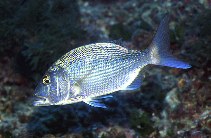| Family: |
Sparidae (Porgies) |
| Max. size: |
100 cm TL (male/unsexed); max.weight: 14 kg |
| Environment: |
benthopelagic; marine; depth range 0 - 200 m |
| Distribution: |
Eastern Atlantic: British Isles to Cape Blanc, Mauritania; (exceptionally further south) Senegal and around the Canary Islands and Madeira. Common south of 40°N (Spain, North Africa) in the Mediterranean (Ref. 4781). |
| Diagnosis: |
Dorsal spines (total): 11-11; Dorsal soft rays (total): 11-12; Anal spines: 3-3; Anal soft rays: 7-9. Body oval and compressed. Canine teeth, with 4 to 6 anterior teeth very developed in each jaw. |
| Biology: |
Inhabit hard bottoms (rock or rubble) down to 200 m depth. Usually found in shallow water less than 50 m deep (Ref. 9987). Adults solitary; young gregarious (Ref. 12482). Young fish caught with traps. Feed on fish, mollusks and cephalopods. Important food fish. Marketed fresh or frozen (Ref. 9987). Some attempts to culture this species have been successful. Due to low market supply, the potential for selling these fish from aquaculture operations seems to be good (Ref. 9987). A spear-fisherman cites a specimen caught in Greece (Corfu) with an overnight bottom-line about 1.60 m and 42 kg (Ref. 48271), but the identification cannot be verified. |
| IUCN Red List Status: |
Vulnerable (VU); Date assessed: 17 August 2009 (A2bd) Ref. (130435)
|
| Threat to humans: |
harmless |
Source and more info: www.fishbase.org. For personal, classroom, and other internal use only. Not for publication.
